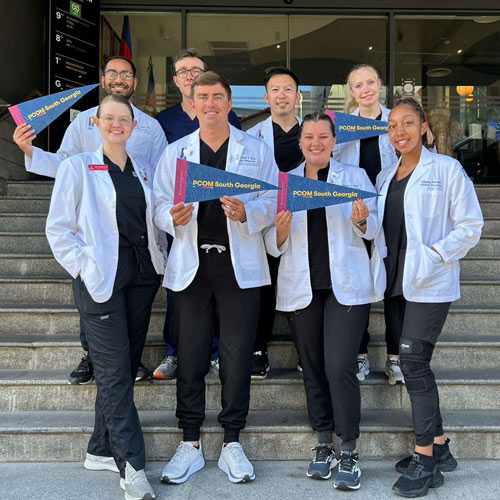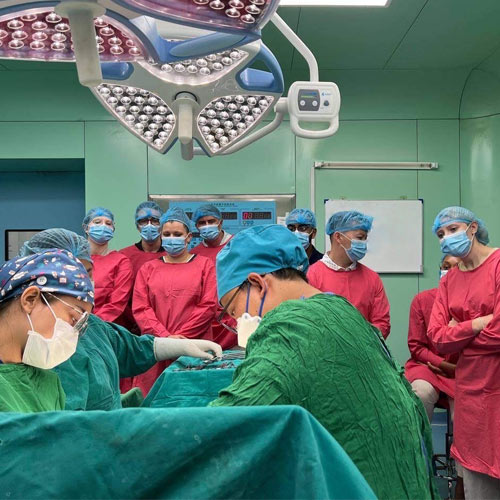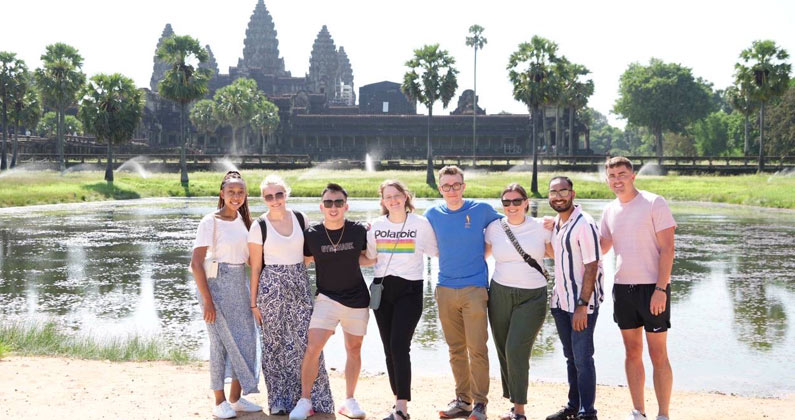Student Doctors Travel to Cambodia
Gain New Perspective on Rural Medicine
August 10, 2023During their free time, the students visited Angkor Watt, a temple complex in Cambodia
that’s considered the largest religious monument in the world. A symbol of Cambodia,
Angkor Watt appears on the nation’s flag.
This summer, seven students who had just completed the first year of the doctor of
osteopathic medicine degree program at PCOM South Georgia in Moultrie, embarked on an adventure that gave them a new appreciation for medicine in the United
States. In addition, they gained a sense of admiration for the determination and resourcefulness
of the physicians and other healthcare workers they met while visiting Cambodia.
“This was cultural immersion, and it gave us all a different perspective,” Pathya
Kunthy (DO '26) said. “Being medical students, we need to be well-versed in and experience what a third-world country is like.”
 In June of 2023, the PCOM South Georgia class of 2026 DO students, all who hail from
Georgia—Tyler Key (DO '26) of Moultrie; Emma High (DO '26) of Saint Simons Island,
Tiffany Pittman (DO '26) of Stockbridge, Grace Perry (DO '26) of Hahira, Krupesh G.
Patel (DO '26) of Valdosta, Pathya “PK” Kunthy (DO '26) of Conyers and Alexander Studebaker
(DO '26) also of Conyers—made the trip. Joining them was Studebaker’s wife, Molly
Studebaker of Covington, a PharmD student at the University of Georgia.
In June of 2023, the PCOM South Georgia class of 2026 DO students, all who hail from
Georgia—Tyler Key (DO '26) of Moultrie; Emma High (DO '26) of Saint Simons Island,
Tiffany Pittman (DO '26) of Stockbridge, Grace Perry (DO '26) of Hahira, Krupesh G.
Patel (DO '26) of Valdosta, Pathya “PK” Kunthy (DO '26) of Conyers and Alexander Studebaker
(DO '26) also of Conyers—made the trip. Joining them was Studebaker’s wife, Molly
Studebaker of Covington, a PharmD student at the University of Georgia.
While Kunthy was born in Cambodia, at a young age he came to the United States where
he was raised by his aunt. His parents remained in Cambodia where they were both physicians
and hospital administrators. Kunthy would return for annual visits. He always wanted
to bring friends with him for one of those visits.
When his medical school friends began talking about opportunities to travel abroad
and see what health care is like in another country, Kunthy recommended his home country.
His mother, now a retired hospital administrator, and his father, now a retired physician
who works in Cambodia’s public health ministry, coordinated the trip.
“Here in South Georgia, we’re supposed to be practicing rural medicine,” Kunthy explained.
“The whole purpose was to go over there to see what rural medicine is really like
and then to appreciate the differences and also look at the similarities. They’re
able to get a majority of procedures done, but with less.”
The students began their journey by spending two days in Phnom Penh, Cambodia, at
Khmer-Soviet Friendship Hospital, where they toured the hospital and observed several
surgical procedures. This hospital, which opened in 1963, was one of the oldest public
hospitals in the country. Kunthy’s mother, Sophal Chuong, MD, retired from the hospital
about five years earlier, and his aunt, who was a midwife there at the time of their
visit, helped show the students around.
The students observed ophthalmology surgery, breast mass removal, brain tumor removal
and some emergency surgeries that included a spinal stabilization and a maxillofacial
surgery. They were surprised that even with the more complex surgical procedures,
general anesthesia was not used very often. Spinal blocks were used instead. When
asked why, the medical staff explained that spinal blocks were easier for patient
recovery.
The next two hospitals the group visited were KV Hospital and China-Cambodia Friendship
Hospital. These were both newer hospitals located in more rural areas. Kunthy’s father,
Kunthy Teng, MD, transitioned from being a physician in Cambodia to working in public
health focusing on HIV control. He arranged for the visits to these other hospitals
so the students could see the difference between the older hospital and the newer
ones.
 While visiting the China-Cambodia Friendship Hospital, the students observed a C-section
delivery. The physician delivering the baby spoke English very well and explained
to the students each part of the procedure. He even compared his preferences for steps
in the procedure to those done by U.S. physicians. For the students, who had not yet
observed a C-section in their studies, it was a preview of what they would learn in
the future. With permission from the mother and the hospital staff, the students used
their cell phones to record the experience. They returned with videos to share with
PCOM faculty and classmates.
While visiting the China-Cambodia Friendship Hospital, the students observed a C-section
delivery. The physician delivering the baby spoke English very well and explained
to the students each part of the procedure. He even compared his preferences for steps
in the procedure to those done by U.S. physicians. For the students, who had not yet
observed a C-section in their studies, it was a preview of what they would learn in
the future. With permission from the mother and the hospital staff, the students used
their cell phones to record the experience. They returned with videos to share with
PCOM faculty and classmates.
The students realized there were some commonalities among all three hospitals that
people in the U.S. take for granted. For one, only the surgical facility had air conditioning.
At the new hospitals, some of the private more expensive rooms had air conditioning,
but the other rooms did not. This was despite the humid summer temperatures. Another
was that scrubs the Cambodian hospital staff members wore tended to be much smaller
than those made for American hospital staff.
“I felt like a giant over there,” said Key, a PCOM student who stood head and shoulders
above his Cambodian hosts. At times the staff had to improvise to make sure Key was
appropriately outfitted.
In Cambodia, the students noticed that for each patient, the entire family came to
the hospital along with the patient. Because of the significant distance from a patient’s
home to the hospital, leaving children at home is not always an option.
“There was a little girl running around in the courtyard by herself because her parent
was being seen by doctors,” High said.
Kunthy explained, “What happens in those rural hospitals, it’s not just one or two
people. It’s the whole family. You’ll see a patient’s whole family camping out in
hallways.”
At every hospital, the students felt like honored guests.
“Each hospital was very welcoming,” Patel said. “The doctors met us at the cars. They
came walking out taking our pictures.”
While the students observed and did not practice medicine, the experience made them
realize that rural medicine is vastly different in each country.
“Comparing the number of doctors and the population, in Cambodia people are often
a few hours away from the nearest hospital or general doctor,” Patel said. “That’s
a different level of rural medicine. Just being able to appreciate that makes me want
to push harder in medical school so I can help people who don’t have the resources
we have here.”
About PCOM South Georgia
In 2019, Philadelphia College of Osteopathic Medicine (PCOM), a premier osteopathic
medical school established in 1899, extended its commitment to the Southeast by establishing
PCOM South Georgia. An additional teaching location in Moultrie, Georgia, PCOM South Georgia offers both
a full, four-year medical program leading to the Doctor of Osteopathic Medicine (DO)
degree and a Master of Science in Biomedical Sciences. PCOM is a private, not-for-profit
institution that trains professionals in the health and behavioral sciences fields.
Joining PCOM Georgia in Suwanee in helping to meet the healthcare needs of the state, PCOM South Georgia
focuses on educating physicians for the region. For more information, visit pcom.edu or call 229-668-3110.
Contact Us
For general media inquiries, please contact the Office of Marketing and Communications
at 215-871-6300 or communications@pcom.edu. Visit our media relations page to view contact information for public relations personnel.
Connect with PCOM South Georgia

 During their free time, the students visited Angkor Watt, a temple complex in Cambodia
that’s considered the largest religious monument in the world. A symbol of Cambodia,
Angkor Watt appears on the nation’s flag.
During their free time, the students visited Angkor Watt, a temple complex in Cambodia
that’s considered the largest religious monument in the world. A symbol of Cambodia,
Angkor Watt appears on the nation’s flag. In June of 2023, the PCOM South Georgia class of 2026 DO students, all who hail from
Georgia—Tyler Key (DO '26) of Moultrie; Emma High (DO '26) of Saint Simons Island,
Tiffany Pittman (DO '26) of Stockbridge, Grace Perry (DO '26) of Hahira, Krupesh G.
Patel (DO '26) of Valdosta, Pathya “PK” Kunthy (DO '26) of Conyers and Alexander Studebaker
(DO '26) also of Conyers—made the trip. Joining them was Studebaker’s wife, Molly
Studebaker of Covington, a PharmD student at the University of Georgia.
In June of 2023, the PCOM South Georgia class of 2026 DO students, all who hail from
Georgia—Tyler Key (DO '26) of Moultrie; Emma High (DO '26) of Saint Simons Island,
Tiffany Pittman (DO '26) of Stockbridge, Grace Perry (DO '26) of Hahira, Krupesh G.
Patel (DO '26) of Valdosta, Pathya “PK” Kunthy (DO '26) of Conyers and Alexander Studebaker
(DO '26) also of Conyers—made the trip. Joining them was Studebaker’s wife, Molly
Studebaker of Covington, a PharmD student at the University of Georgia. While visiting the China-Cambodia Friendship Hospital, the students observed a C-section
delivery. The physician delivering the baby spoke English very well and explained
to the students each part of the procedure. He even compared his preferences for steps
in the procedure to those done by U.S. physicians. For the students, who had not yet
observed a C-section in their studies, it was a preview of what they would learn in
the future. With permission from the mother and the hospital staff, the students used
their cell phones to record the experience. They returned with videos to share with
PCOM faculty and classmates.
While visiting the China-Cambodia Friendship Hospital, the students observed a C-section
delivery. The physician delivering the baby spoke English very well and explained
to the students each part of the procedure. He even compared his preferences for steps
in the procedure to those done by U.S. physicians. For the students, who had not yet
observed a C-section in their studies, it was a preview of what they would learn in
the future. With permission from the mother and the hospital staff, the students used
their cell phones to record the experience. They returned with videos to share with
PCOM faculty and classmates.